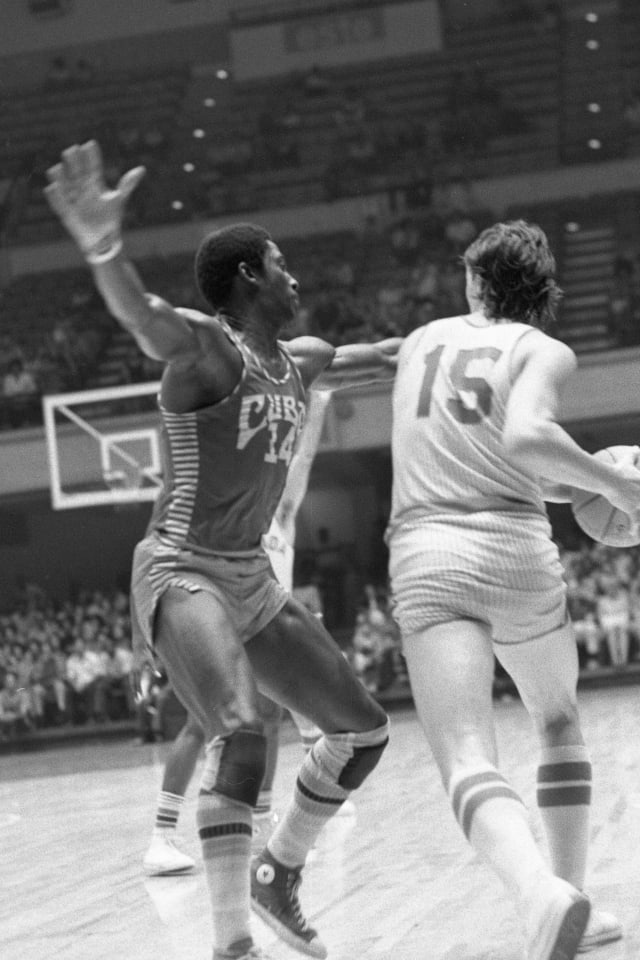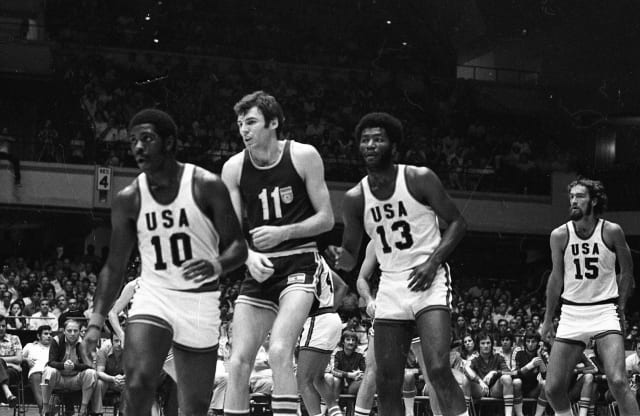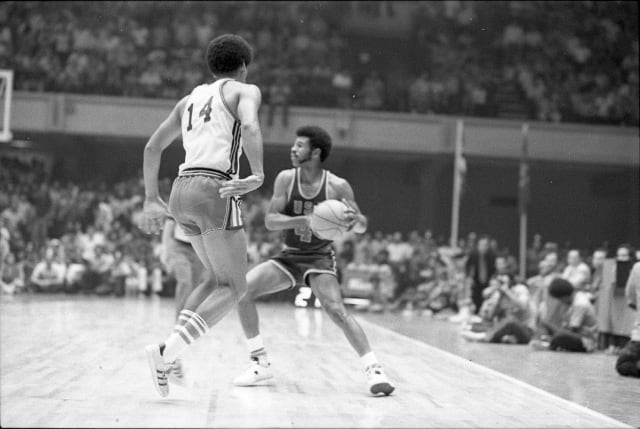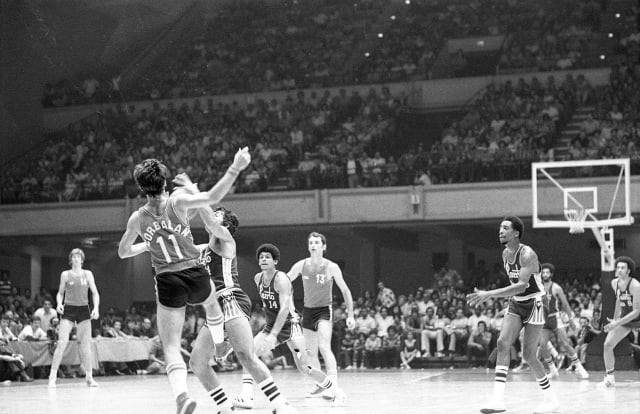The Best of 1974 World Cup: Soviet Union top three-way tie for second world title
The FIBA Basketball World Cup was back in the Americas with Puerto Rico hosting in 1974. The Soviet Union became world champions for a second time after 1967. Yugoslavia finished second and USA third.
MIES (Switzerland) - Once again the FIBA Basketball World Cup was back in the Americas in 1974 with Puerto Rico hosting the seventh edition of basketball flagship competition. In the end, the Soviet Union became world champions for a second time with the 1970 winners Yugoslavia taking second place and United States finishing third.
Soviet Union added to their crown from 1967 after they ended Final Round play atop a three-way tie with Yugoslavia and USA. The tournament also saw the start of Spain emerging as a world challenger.
The best team: Soviet Union
| Rank | Team | W-L |
| 1. | Soviet Union | 8-1 |
| 2. | Yugoslavia | 6-1 |
| 3. | USA | 8-1 |
| 4. | Cuba | 5-4 |
| 5. | Spain | 4-5 |
| 6. | Brazil | 4-5 |
| 7. | Puerto Rico | 2-5 |
| 8. | Canada | 3-6 |
| 9. | Mexico | 5-2 |
| 10. | Czechoslovakia | 4-3 |
| 11. | Argentina | 2-5 |
| 12. | Australia | 2-5 |
| 13. | Philippines | 2-5 |
| 14. | Central African Republic | 0-7 |
The 1974 FIBA World Cup, known as the FIBA World Championship at the time, returned to the Americas after the 1970 edition took place in Yugoslavia. FIBA held the 1974 World Cup in Puerto Rico from July 3-14 with the games being played in San Juan, Caguas and Ponce.
After four World Cups with 13 teams, 14 nations converged on Puerto Rico: hosts Puerto Rico; title holders Yugoslavia; Spain, Soviet Union and Czechoslovakia from Europe; Brazil and Argentina from South America; Mexico and Cuba from CentroBasket; Asian continental winners Philppines; African champions Central African Republic; Oceania champions Australia; as well as invited teams from the Americas, USA and Canada.
In a change from past tournaments both hosts Puerto Rico and reigning champs Yugoslavia received byes into the Final Round. The other 12 countries were divided into groups of four with the top two finishers advancing to the Final Round.
Soviet Union, USA and Cuba all won their respective groups with 3-0 records and were joined by second-place finishers Brazil, Spain and Canada.
One major highlight of the Preliminary Round was the first game of the competition with Soviet Union heavily beating Central African Republic 140-48. That result set two records: the most points scored in a single game (140) and the biggest difference (+92).
 Alejandro Urgelles (left) helped Cuba take first place in their Preliminary Round group
Alejandro Urgelles (left) helped Cuba take first place in their Preliminary Round group
The first two days of the Final Round did not have any significant results but that changed on game day 3 as Yugoslavia beat Soviet Union 82-79 with Dragan Kicanovic scoring 19 points. Yugoslavia needed 34 points from Kicanovic later against Canada to narrowly avoid a slip-up, winning 102-99 in overtime.
A World Cup record was set on the penultimate day with Spain's Wayne Brabender making his 36th consecutive free throw in a 93-91 overtime win over Brazil. Sergej Belov of Soviet Union had held the previous mark of 35 straight free throws made in 1970.
The penultimate day also saw a massive showdown between undefeated powers USA and Yugoslavia. The Europeans led 50-41 at halftime but USA rallied back behind Ticky Burden's 27 points for a 91-88 win to inject even more intrigue into the final day of action.
 Quinn Buckner (No. 10) and Tom Boswell (No. 13) face Kresimir Cosic of Yugoslavia (No. 11)
Quinn Buckner (No. 10) and Tom Boswell (No. 13) face Kresimir Cosic of Yugoslavia (No. 11)
After Yugoslavia beat Spain 79-71, the stage was set for Soviet Union vs USA with the Soviets needing to win by 4 points or more to win the title in a three-way tiebreaker. The game was knotted 55-55 at halftime but Soviet Union pulled away and won 105-94 to take the crown.
The best player: John Lucas MVP
For the third straight World Cup, the Most Valuable Player award went to a player not on the winning team - this time John Lucas taking home the trophy for the third-placed finishers USA. The American guard averaged 20.2 points per game - tying with his Ticky Burden for team high.
Lucas started the tournament on fire with 30 points against Philippins and 25 points versus Spain. He never scored fewer than 15 points and he tallied 16 points in USA's big win over Yugoslavia in the penultimate game. But Lucas' 18 points in the final showdown with Soviet Union were not enough as the Americans lost 105-94 to take third place.
The 1974 World Cup would end up being the only time Lucas played for USA in a FIBA competition.
 John Lucas
John Lucas
Lucas was joined on the All-Tournament Team by Alexander Belov and Alexander Salnikov of champions Soviet Union, Dragan Kicanovic of Yugoslavia and Wayne Brabender of Spain.
The best game : Soviet Union vs. USA
The Soviet Union were coming off their controversial 51-50 victory over USA in the Final of the 1972 Olympics with Alexander Belov's winner at the buzzer. But the Soviets also had finished just third at the FIBA EuroBasket 1973, failing to capture a ninth consecutive European title.
The Soviets were still the powerhouse in world basketball and despite losing to Yugoslavia earlier in the Final Round, Hall of Fame coach Vladimir Kondrashin and his team knew they only needed a four-point win over USA in their final game and they would once again be atop the world.
The Americans got into foul trouble early but the game was even 55-55 at halftime. The Soviets featured the unstoppable Alesander Salnikov, who scored 38 points including a perfect 14-of-14 from the free throw line. Free throws ended up being a major factor as the Soviet Union made 37-of-44 from the charity stripe compared to 22-of-30 for USA.
Besides Salnikov, Alexander Belov tallied 16 points and captain Modestas Paulauskas added 11 points for a 105-94 victory. And the country's second world championship trophy was going back to Moscow.
The best story: Spain emerge as world challenger
The big story of the tournament was the big trio of Soviet Union, Yugoslavia and United States finishing tied in the Final Round to share the podium, but another big story was Spain.
The early foundation of later greatness was laid for Spain, who finished fifth in their first appearance on the global stage since 1950. The Spanish team featured a number of players who had helped Real Madrid become a continental power including Wayne Brabender, Clifford Luyk, Juan Antonio Corbalan, Vicente Ramos, Carmelo Cabrera and Rafael Rullan.
The squad also was the bridge generation between Spain's team from the 1968 Olympics - Luyk and Jose Luis Sagi-Vela - and the trio of Brabender, Corbalan and Luis Miguel Santillana who would play at the 1980 Olympics.
Brabender, Corbalan and Luyk would all also be named in 1991 among FIBA's 50 Greatest Players. At the 1974 World Cup, Spain beat Argentina and Philippines to reach the Final Round and then knocked off Puerto Rico and Brazil for a fifth-place showing.
 Juan Antonio Corbalan (No. 11) and Clifford Luyk (No. 13) for Spain vs Puerto Rico
Juan Antonio Corbalan (No. 11) and Clifford Luyk (No. 13) for Spain vs Puerto Rico
The best performance: Arturo Guerrero
Mexico finished ninth in the World Cup, meaning the top spot outside the Final Round as they went undefeated in the Classification 9-14 after losing to Brazil and Soviet Union in the Preliminary Round. Mexican Arturo Guerrero ended up being the top scorer per game with an average of 27.0 points throughout the tournament.
Guerrero had the highest single game output with 42 points in the Preliminary Round win over Central African Republic. He also poured in 38 points in the Classification 9-14 win over Czechoslovakia.
Stats leaders
Scorers
| Player (country) | Points Per Game |
| Arturo Guerrero (Mexico) | 27.0 |
| Manuel Raga (Mexico) | 25.8 |
| Eddie Palubinskas (Australia) | 24.6 |
| Wayne Brabender (Spain) | 23.0 |
| Ernesto Gehrmann (Argentina) | 22.3 |
| Alejandro Urgelles (Cuba) | 20.4 |
| Ticky Burden (USA) | 20.2 |
| John Lucas (USA) | 20.2 |
| Dragan Kicanovic (Yugoslavia) | 19.9 |
| William Adornado (Philippines) | 18.0 |
| Jiri Zidek (Czechoslovakia) | 18.0 |
FIBA